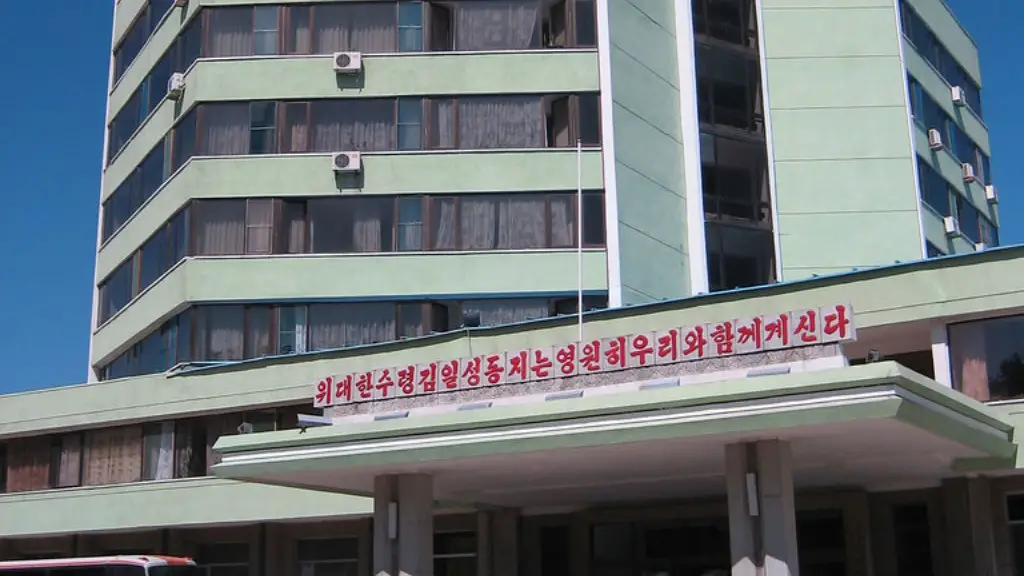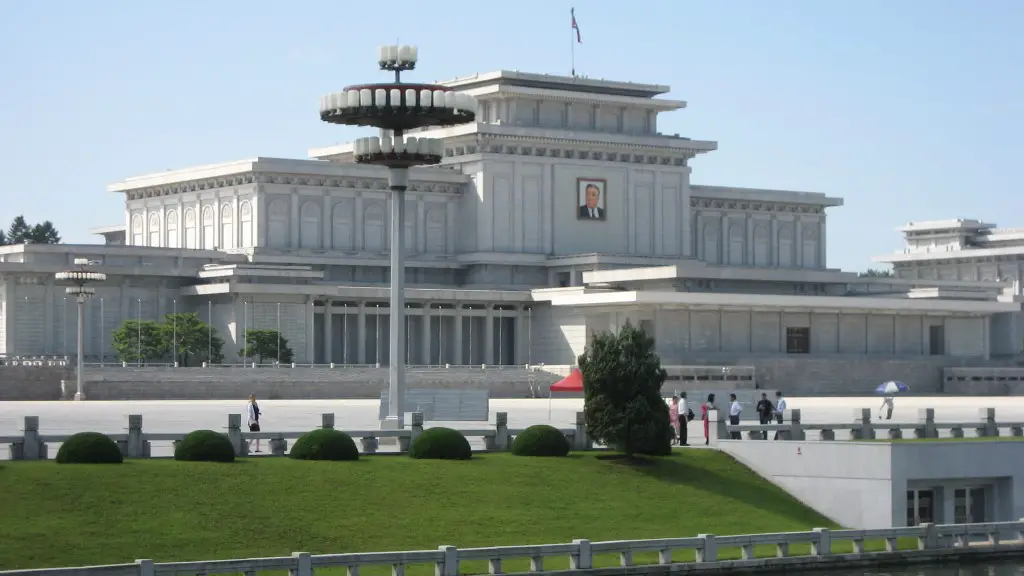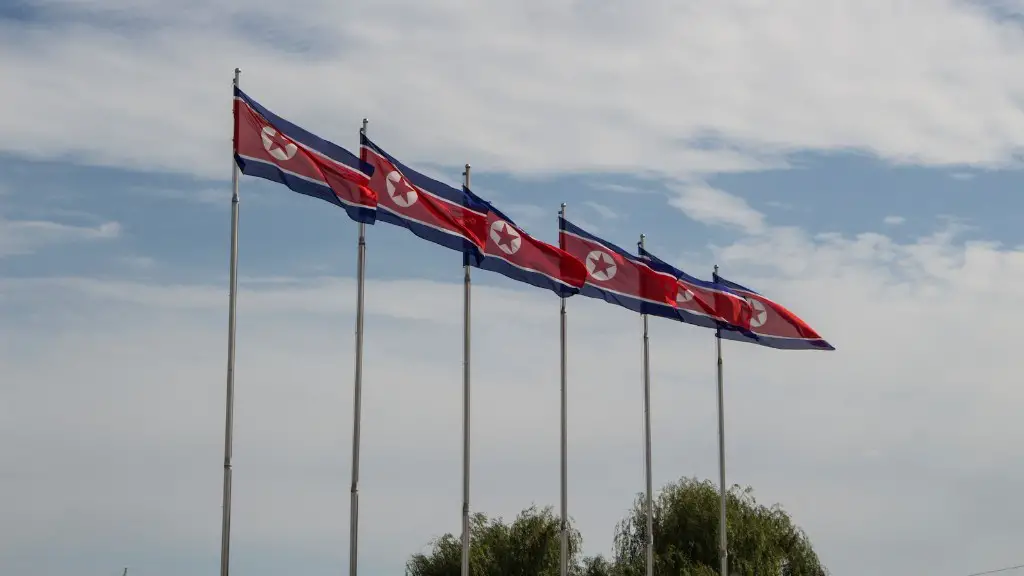When Was North Korea Established
North Korea, officially the Democratic People’s Republic of Korea (DPRK), is a sovereign state located in the northern part of the Korean peninsula. It is governed as a single-party totalitarian socialist state which has been in existence since 1948.
The nation was founded on September 8th, 1948 when the Democratic People’s Republic of Korea was established following the proclamation of the Workers Party of Korea, a Marxist-Leninist party inspired by the Soviet Union’s October Revolution. The boundaries of the DPRK were drawn up soon after, with the nation being cordoned off from South Korea and the rest of the world.
The original government of North Korea was formed by Kim Il-sung, a revolutionary military leader who had been the head of the guerrilla movement which fought against the Japanese occupation of Korea in the 1940s. He eventually rose to become the leader of North Korea, and established a personality cult around himself and his family – leading to his son Kim Jong-il and grandson Kim Jong-un taking power following his death.
At the time of its formation, the Democratic People’s Republic of Korea had been suffering from an economic depression caused by the division of the peninsula into two distinct and separate nations. Despite the initial economic difficulties, North Korea’s economy was to develop and become heavily industrialized over the next few decades – with the nation becoming highly militarized under Kim Il-sung’s rule.
North Korea remains isolated from many parts of the world even today. It has maintained close ties with its ally, China, since the establishment of North Korea in 1948. In recent years, North Korea has become even more isolated due to increased tensions with South Korea and the United States. North Korea’s government focuses heavily on maintaining its control over the population, with censorship and surveillance of citizens being commonplace.
The nation officially celebrates its National Liberation Day on August 15th of each year – commemorating the day it was proclaimed independent and free from foreign rule. Despite the nation’s founding in 1948, it is important to note that the Democratic People’s Republic of Korea is the latest incarnation of the Korean peninsula’s centuries-old history.
Military Conflict
In 1950, North Korea invaded South Korea – setting off the Korean War that would last a grueling three years and claim the lives of more than two million Korean civilians. Following the Korean War, North Korea was declared to be a permanent enemy of the United States, with both nations engaging in hostile exchanges throughout the Cold War.
In recent years, North Korea has become increasingly hostile to the rest of the world. It has tested nuclear weapons in violation of international law and threatened both South Korea and the United States with destruction. North Korea has long maintained a vast army and has been accused of using this army to commit human rights violations. It is estimated that up to 200,000 North Koreans have died due to North Korea’s oppressive policies.
The government of North Korea has been accused of using its military to commit atrocities against its people and its neighbours. The nation has been accused of holding prisoners in political prison camps, where they are subjected to torture, summary executions and forced labour. In addition, North Korea has been accused of sponsoring terrorist attacks, cyber attacks and human rights violations.
In recent years, North Korea has become an increasingly belligerent state, and tension between it and its neighbours continues to grow. As of 2021, peace talks between North Korea and the rest of the world have not been successful, and North Korea is yet to be recognized as a full member of the international community.
United Nations Relationships
North Korea has been involved in the United Nations since their acceptance into the organization in 1991. However, their relationship with the UN has been troubled since then. North Korea has refused to comply with a number of UN resolutions that are directed toward them and has consistently refused to cooperate with UN inspectors.
In recent years, the UN has grown increasingly concerned with North Korea’s nuclear program and human rights violations. To this end, the UN has sanctioned North Korea several times – imposing a range of economic and military restrictions on the nation. These sanctions have had a significant impact on the North Korean economy and have resulted in widespread food shortages among the population.
Despite these sanctions, North Korea has refused to cooperate with the UN and has continued to develop its nuclear weapons program. As a result, the UN has imposed additional sanctions and restrictions on North Korea as a means of attempting to pressure the nation into increasing its cooperation with the international community.
The UN has also worked to engage North Korea in diplomatic dialogue and is hopeful that it can work to de-escalate tensions and bring peace to the region. However, North Korea’s refusal to cooperate with the UN has so far hindered any meaningful progress.
Ongoing Diplomatic Efforts
In recent years, an increasing number of countries have attempted to engage North Korea in diplomatic dialogue. This includes a number of countries in the region, such as South Korea, Japan and China, as well as global powers such as the United States and Russia.
The United States and North Korea have engaged in a number of high-level talks in recent years, with the two countries attempting to work towards an international agreement which would lead to denuclearization in the region. However, discussions between the two have been stalled in recent years due to North Korea’s refusal to cooperate with international sanctions.
South Korea has also attempted to engage North Korea in dialogue in recent years, with the two countries meeting in 2018 in what was the first inter-Korean summit in over a decade. The summit marked a significant step forward in the dialogue between North and South Korea, with the two countries agreeing to work towards denuclearizing the Korean peninsula.
Meanwhile, China has maintained a close relationship with North Korea in recent years and continues to provide economic support to the nation. China has sought to work towards resolving the diplomatic impasse in the region, working alongside the United States in attempting to push North Korea towards denuclearization.
Human Rights Concerns
North Korea is widely regarded as one of the most repressive states in the world and has a long history of human rights abuses. The nation is known to oppress its citizens and restrict their basic rights, with dissidents and political opponents being arbitrarily detained. In addition, freedom of expression and the right to dissent are severely restricted in the country.
In addition, North Korea is known to practice censorship and surveillance over its citizens, with the nation having a heavily monitored internet and telecommunications infrastructure. Reporters Without Borders has ranked North Korea as one of the most repressive media environments in the world, and the nation is known to rarely, if ever, allow foreign media access.
The nation’s oppressive policies have been condemned by the United Nations and human rights organizations. In 2020, UN experts condemned North Korea’s human rights record as “deplorable and unacceptable”, and called for the nation to end its oppressive practices.
North Korea’s human rights record is viewed as a major obstacle to the nation’s relationship with the rest of the world, with much of the international community unwilling to work with the nation until it commits to reforming its oppressive policies.
The Road Ahead
As of 2021, North Korea remains isolated from the international community and is yet to be recognized as a full member of the world’s nations. It is clear that further diplomatic dialogue is required in order to improve the relationship between North Korea and its neighbours, as well as the global community at large.
However, it appears that the nation is unlikely to change its approach to the world anytime soon. North Korea’s long history of oppressive policies and disregard for international law have resulted in significant mistrust and fear of the nation. This fear has hindered the progress of any diplomatic solution to the various disputes that have erupted between North Korea and the rest of the world.
It remains to be seen whether the nation can be convinced to cooperate with the international community and to participate in meaningful dialogue. It is clear, however, that North Korea’s actions will continue to shape the future of the Korean peninsula and the rest of the world for years to come.
International Reactions
The international community has reacted to North Korea with both concern and condemnation in recent years. The United Nations and a number of other international organizations have placed pressure on North Korea to change its policies, but thus far the nation has refused.
In the United States, North Korea’s actions have been met with stern responses from the government. In 2017, President Trump threatened “fire and fury” against North Korea following a series of nuclear missile tests, while the United States also imposed harsh economic sanctions on the nation in an effort to induce change.
In Europe, leaders have also responded to North Korea’s hostility with a mixture of concern and condemnation. Countries such as the United Kingdom, France and Germany have all expressed alarm at the risk posed by North Korea’s nuclear program, while international organizations such as the European Union have placed economic sanctions on the nation in response to its hostile actions.
Meanwhile, China, North Korea’s closest ally, has sought to act as a mediator between the nation and the rest of the world. China has consistently called for diplomatic dialogue with North Korea and even provided economic aid and support to the nation in an effort to ease tensions in the region.
Public Opinion
North Korea’s actions have been met with widespread condemnation from the public. A number of polls have found that the majority of people in the United States, Europe and other parts of the world view North Korea as a threat to peace and stability in the region.
At the same time, a number of people in the region have expressed sympathy towards the people of North Korea. Despite the nation’s isolated status, people in the United Nations, China and South Korea have all expressed concern at the human rights abuses taking place in the country and have called for change.
Ultimately, the relationship between North Korea and the rest of the world remains tense and uncertain. Until the nation is willing to cooperate with diplomatic initiatives and reform its oppressive policies, it is unlikely that its relationship with the rest of the world will improve any time soon.





